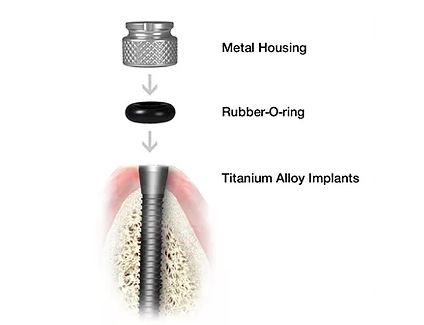Mini dental implants (MDIs) are smaller than the most commonly used dental implant sizes, sometimes called small-diameter or narrow-diameter implants (SDIs or NDIs). Mini implants are placed through less-invasive techniques and measure less than 3 millimeters in diameter. Standard implants are slightly larger, usually 3.25 – 5 millimeters in diameter. Mini implants are often used to secure a complete lower or loose denture in patients who are not candidates for traditional dental implant surgery.
Typically, the procedure takes only one appointment and can be completed within 2-hours.
-
With heads shaped like balls, the implants protrude from the gum tissue, providing a secure anchor for your dentures.
-
Metal housings with a rubber O-ring will be inserted into the bottom of your dentures.
-
When your dentist seats the dentures on the mini dental implants, the O-ring snaps over the ball like a socket and locks the dentures firmly into place as they gently rest on the gum tissue.
Because of the minimally invasive nature of the mini dental implant procedure, the MDI placement won’t require you to go through a lengthy healing period.
Frequently Asked Questions:
Is the MDI Mini Dental Implant placement painful?
No, MDI mini dental implants are placed with a local anesthetic. Unlike full-size implants, MDI implants are usually placed without making an incision in the gum. You should feel slight discomfort, if any, after placement. Generally, any discomfort you do feel will go away within 48 hours. Over-the-counter pain relievers are usually adequate. If needed, your dentist can prescribe pain medication to control the discomfort, which you should take as directed.
How long does the procedure take?
MDI mini dental implants can be placed and your denture fitted in about 1 ½ to 2 hours. Your dentures will feel stable and secure. Though mild discomfort may exist, you should not experience excessive bleeding. You may eat when you’re hungry, but avoid excessively hard or sticky foods for a period recommended by your dentist.
How do I take out the dentures?
-
Place your thumbs under each side of the lower denture rim.
-
Push both sides up at the same time. You can also use your tongue to assist in the removal.
-
Rinse your mouth with an antiseptic mouthwash.
-
3M™ MDI Mini Dental Implants also recommends using an ACCESS™ toothbrush, which has been specifically designed to clean your implants while gently stimulating the surrounding gum tissue.
How do I put in the dentures?
-
First, you must clean and remove any food and bacterial debris from the ball of the implants and O-ring features.
- This prevents gum inflammation caused by plaque, which could be forced into the O-ring fixtures and cause improper seating and problems with retaining the dentures in the mouth.
-
Grasp the denture with both hands and lightly seat it so that you feel the O-rings resting above the ball head of the implants.
-
Press down firmly and equally on both sides until the denture snaps into place.
What if I have trouble putting in the denture?
Always remember that the implants and the dentures must be clean. You might need a lighter touch to rest each implant over its corresponding socket. When you push down on both sides of the denture, ensure you do so equally. If you still have difficulty, you may need someone like a spouse or family member to help you get the feel for placing the denture.
What about care and maintenance?
Recommends the ACCESS™ toothbrush for brushing and cleaning the implants and O-rings. In addition, ultrasonic cleaners are ideal for ensuring the metal housings are free from food impaction and debris. Either mouthwash or 50-50 peroxide-water mixes are reasonable solutions for the ultrasonic cleaner. You can also use a Waterpik® to rinse out the implants and O-rings. Do not use effervescent cleaners, as they might cause the O-rings to deteriorate. If the dentures are not secure, contact your dentist to discuss your problems. Your dentist will perform the appropriate checkup and determine the condition and maintenance of your gums, the implants, and the O-rings.
Are MDI mini dental implants covered by my insurance?
As with most elective dental procedures, insurance coverage varies widely. Ask your dentist about payment plan options if your insurance company does not cover dental implants.


